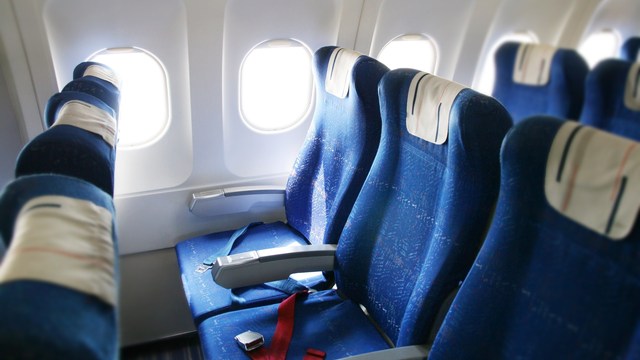 Davoust Laurent/PhotoSpin
Davoust Laurent/PhotoSpin
For years, airlines have made headlines for their policies regarding obese and overweight passengers. Besides potentially having to buy a second seat, larger passengers could now be taxed for their weight.
Dr. Bharat P. Bhatta, associate professor of economics at Sogn og Fjordane University College, Norway suggested airlines charge a tax based on weight, referred to unofficially as a “fat tax.” The proposal’s aim is to help airlines reduce fuel costs, according to various sources like The Telegraph and CNN.
There are three proposed tax methods: total weight, base fare +/- extra, and high/average/low, according to CNN.
In the first method, the total weight of the passenger and the luggage is calculated, and a certain amount is charged per kilo.
In the second method, passengers are charged a base fare, and anyone overweight or underweight is charged extra or given a discount per kilo compared to the base.
The third method has a base fare and a planned discount or surcharge is given (not per kilo) based on passenger weight.
If one of these methods is approved by airlines, you might be required to arrive even earlier to “weigh in.”
Some are also concerned about what a “fat tax” could mean for the mental health and body image of passengers.
Lynn Grefe, the president and CEO of National Eating Disorders Association, said in a press release that an airline tax could increase stigma against overweight and obese people.
“This is a misguided policy suggestion that attempts to account for fuel cost, but completely fails to account for the human cost of stigmatizing people with larger bodies,” Grefe said.
She added that these methods could trigger eating disorders, and is concerned that discounts would potentially encourage people already struggling with anorexia, while healthy people who also happen to be larger would be taxed unfairly.
“Body shaming and weight discrimination are already too common and, sadly, not being addressed in a society obsessed with body image,” Grefe said.
“We know that people who are demonized for their size often attempt dangerous dieting behaviors that put them more at risk for disordered eating and, ultimately, eating disorders.”
People should not be compared to luggage, and airline weight taxes could also pit people against each other, while promoting weight bias, she said in the press release and an email interview.
Although she is not an expert, she believes there are other ways for airlines to save money without placing blame on waistlines. She also has some suggestions for how to avoid weight discrimination.
“I believe the most helpful thing the airline could do is make the seats more comfortable for everyone, by allowing a bit more room,” Grefe said in an email.
“We come in all shapes and sizes, and that means that tall people may also have a difficult time on planes as they seek leg room.”
Yet many people are in support of the proposed tax. Almost half of Britons in a poll approved of the tax, according to The Telegraph.
“The poll demonstrates that people really do discriminate against people of size, and that they are unaware of the implications to those vulnerable to eating disorders, or how negatively it could impact those who are currently struggling,” Grefe said.
Pablo Solomon, an artist and designer, said in an email that he personally is not opposed to an airline "fat tax". He is used to paying extra for transporting his artwork, even when other passengers weigh more than both him and his artwork.
“Airlines are not in the mental health business but in the business of transporting weight from place to place - whether in the form of freight or people,” Solomon said.
“People who are overweight know they are overweight, and they know that it would be in their best interest to lose weight. Having to pay the airlines to transport the extra weight that they are carrying should be no shocker.”
He doesn’t believe overweight people will be more prone to mental health and body image issues as a result of a "fat tax".
Solomon said he thinks many people already support charging obese people for two seats if they are unable to fit in one seat, or charging them more money to sit in larger seats. However, he does agree that current airline seats are not comfortable even for average-sized passengers.
Sources:
Smith, Oliver. The Telegraph. Airline ‘fat tax’ backed by half of Britons. Web. April 1, 2013.
http://www.telegraph.co.uk/travel/travelnews/9954221/Airline-fat-tax-backed-by-half-of-Britons.html
Durston, James. CNN. Airline ‘fat tax’ : Should heavy passengers pay more? Web. April 1, 2013.
http://travel.cnn.com/airline-fat-tax-should-heavy-passengers-pay-more-619046
NEDA. National Eating Disorders Association Weighs in on Proposed Airline ‘Fat Tax.’ Web. April 1, 2013.
http://www.nationaleatingdisorders.org/national-eating-disorders-association-weighs-proposed-airline-%E2%80%98fat-tax%E2%80%99
Fitzpatrick, Dan. Pittsburgh Post-Gazette. Airline Making Heavyset Flyers Buy Extra Seat. Web. April 1, 2013.
http://www.post-gazette.com/stories/business/news/airline-making-heavyset-flyers-buy-extra-seat-573638
Grefe, Lynn. Email interview. April 1, 2013.
Solomon, Pablo. Email interview. April 1, 2013.
Study: http://www.palgrave-journals.com/rpm/journal/v12/n2/full/rpm201247a.html
Reviewed April 2, 2013
by Michele Blacksberg RN
Edited by Jody Smith




Add a Comment3 Comments
Hi! http://www.zuup.com/what-is-zuup here. You have a great blog here. I will keep on visiting your site and be updated with our latest post. Have a great day!!
April 11, 2013 - 7:17pmThis Comment
Personally as someone with an eating disorder I think that this can cause increase in symptoms for someone with an eating disorder already or might even create more stigma in with EDS. honestly it is very hard lose weight..
April 9, 2013 - 4:48pmThis Comment
As a body builder I guess I have to pay more. The good news I don't have to fly. The airlines keep giving me reasons not to fly. This would be the last reason they would give. I guess they could afford to lose many of their passengers.
Stoker
April 2, 2013 - 6:17pmThis Comment